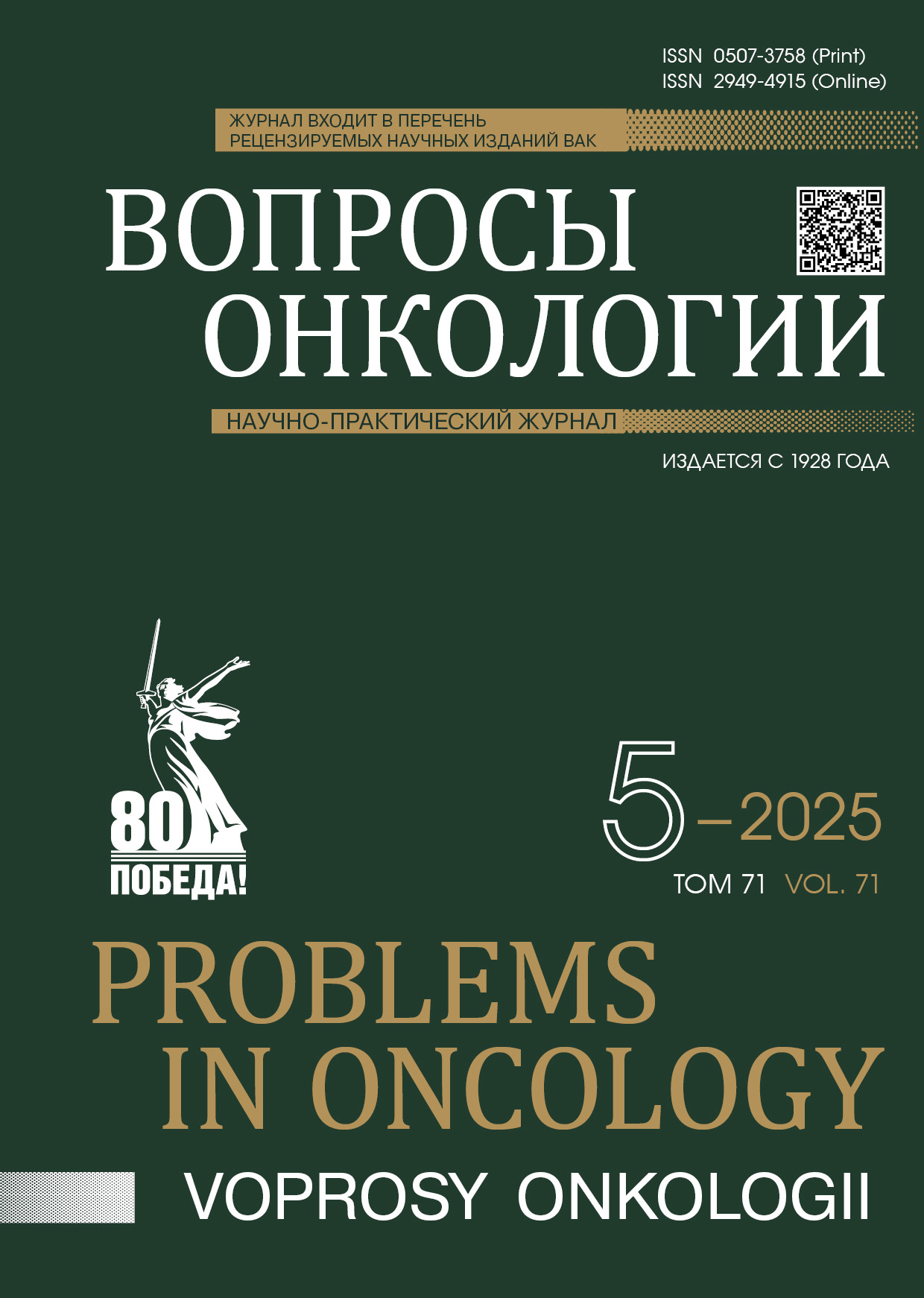Abstract
Introduction. Two primary preoperative radiotherapy regimens are currently utilized for rectal cancer patients: short-course radiotherapy (SCRT) and prolonged-course chemoradiotherapy (CRT). Despite evidence from phase III randomized trials, optimal indications for each regimen remain undefined. This challenge becomes particularly critical during healthcare system strain, such as pandemics.
Aim. To evaluate immediate treatment outcomes between neoadjuvant radiotherapy regimens for non-metastatic rectal cancer during adverse epidemiological conditions..
Materials and Methods. We conducted a multicenter retrospective cohort study including patients aged 18-82 years with verified non-metastatic rectal cancer receiving radiotherapy between 2019-2022. Participants were stratified into SCRT and CRT groups. Propensity score matching was employed for cohort balancing, followed by analysis of immediate treatment outcomes.
Results. Among 302 initially enrolled patients, propensity matching yielded 94 matched pairs from four institutions. Acute toxicity was significantly more frequent in the CRT group (66% vs 18.1%, p<0.001), with grade 3 toxicity observed in 4.3% of CRT patients versus 0% in SCRT patients. Radiotherapy regimen did not affect circumferential resection margin clearance, lymphovascular invasion rates, sphincter preservation frequency, or pathological complete response rates (20.2% CRT vs 24.5% SCRT, p=0.768). However, treatment-interrupting COVID-19 infections differed significantly between regimens (8.5% CRT vs 1.1% SCRT, p=0.017).
Conclusion. Short-course radiotherapy demonstrates superior safety profiles with reduced toxicity and treatment interruptions while maintaining non-inferior oncological outcomes compared to conventional chemoradiotherapy.
References
Cedermark B., Dahlberg M., Glimelius B., et al. Improved survival with preoperative radiotherapy in resectable rectal cancer. N Engl J Med. 1997; 336(14): 980-7.-DOI: https://doi.org/10.1056/NEJM199704033361402.
Ciseł B., Pietrzak L., Michalski W., et al. Long-course preoperative chemoradiation versus 5× 5 Gy and consolidation chemotherapy for clinical T4 and fixed clinical T3 rectal cancer: long-term results of the randomized Polish II study. Ann Oncol. 2019; 30(8): 1298–303. DOI: https://doi.org/10.1093/annonc/mdz186
Ngan S.Y., Burmeister B., Fisher R.J., et al. Randomized trial of short-course radiotherapy versus long-course chemoradiation comparing rates of local recurrence in patients with T3 rectal cancer: Trans-Tasman Radiation Oncology Group trial 01.04. J Clin Oncol. 2012; 30(31): 3827–33.-DOI: https://doi.org/10.1200/jco.2012.42.9597, URL https://ascopubs.org/doi/10.1200/JCO.2012.42.9597.
Erlandsson J., Holm T., Pettersson D., et al. Optimal fractionation of preoperative radiotherapy and timing to surgery for rectal cancer (Stockholm III): a multicentre, randomised, non-blinded, phase 3, non-inferiority trial. Lancet Oncol. 2017; 18(3): 336–46.-DOI: https://doi.org/10.1016/S1470-2045(17)30086-4. URL: https://www.thelancet.com/journals/lanonc/article/PIIS1470-2045(17)30086-4/fulltext.
Dijkstra E.A., Nilsson P.J., Hospers G.A.P., et al. Locoregional failure during and after short-course radiotherapy followed by chemotherapy and surgery compared with long-course chemoradiotherapy and surgery: A 5-year follow-up of the RAPIDO trial. Ann Surg. 2023; 278(4): e766-e772.-DOI: https://doi.org/10.1097/SLA.0000000000005799.-URL: https://journals.lww.com/annalsofsurgery/fulltext/2023/10000/locoregional_failure_during_and_after_short_course.35.aspx.
National Comprehensive Cancer Network. Rectal Cancer (Version 2.2025). NCCN. 2025.-URL: https://www.nccn.org/professionals/physician_gls/pdf/rectal.pdf.
Ганцев Ш.Х., Меньшиков К.В. Онкологическая служба в условиях пандемии COVID-19 (обзор литературы). Креативная хирургия и онкология. 2020; 10(3): 233-240.-DOI: https://doi.org/10.24060/2076-3093-202010-3-233-240. [Gantsev Sh.Kh., Menshikov K.V. Oncological care during the Covid-19 pandemic (literature review). Creative Surgery and Oncology. 2020; 10(3): 233-240.-DOI: https://doi.org/10.24060/2076-3093-202010-3-233-240 (in Rus)].
Van der Valk M.J.M., Marijnen C.A.M., van Etten B., et al. Compliance and tolerability of short-course radiotherapy followed by preoperative chemotherapy and surgery for high-risk rectal cancer — Results of the international randomized RAPIDO-trial. Radiother Oncol. 2020; 147: 75–83.-DOI: https://doi.org/10.1016/j.radonc.2020.03.011.-URL: https://www.thegreenjournal.com/article/S0167-8140(20)30120-1/abstract.
Marijnen C.A.M., Peters F.P., Rödel C., et al. International expert consensus statement regarding radiotherapy treatment options for rectal cancer during the COVID 19 pandemic. Radiother Oncol. 2020; 148: 213-215.-DOI: https://doi.org/10.1016/j.radonc.2020.03.039.
Ишкинин Е.И., Ибраев Р.З., Раймбеков Р.Б., et al. Услуги лучевой терапии во время пандемии COVID-19. Онкология и радиология Казахстана. 2021; 2(60): 22-24.-DOI: https://doi.org/10.52532/2521-6414-2021-2-60-22-24.-EDN: GEJBQO. [Ishkinin Y.I., Ibrayev R.Z., Raimbekov R.B., et al. Radiation therapy services during the COVID-19 pandemic. Oncology and Radiology of Kazakhstan. 2021; 2(60): 22-24.-DOI: https://doi.org/10.52532/2521-6414-2021-2-60-22-24.-EDN: GEJBQO (in Rus)].

This work is licensed under a Creative Commons Attribution-NonCommercial-NoDerivatives 4.0 International License.
© АННМО «Вопросы онкологии», Copyright (c) 2025

